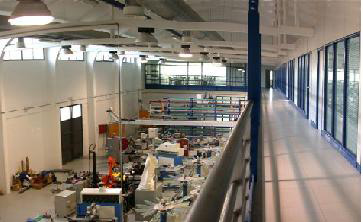by Andrea Chiodi, Fabrizio Silva and Andrea Ballarino
The experimental shoe factory in Vigevano allows customers to order their shoes online, with their feet being measured via a 3D digital scan. A Web-based service processes the customer request, accompanied by the foot measurements. The measurements are then matched against existing collections of shoes and a made-to-measure production order is launched.
The Integrated Pilot Plant (IPP) of ITIA CNR is an experimental factory for shoe production designed to handle the whole life cycle of a customizable product. It is located in Vigevano (Italy), a city with a well-known tradition in shoe manufacturing, and is the result of a series of research projects at both Italian and European levels, which have been led by ITIA over the last ten years. These projects focused on the development of Internet-based services, considered strategic for the development of a shoe industry that aims to maintain direct contact with its customers in order to satisfy their specific needs and tastes. The guiding concepts are standardization, collaboration and sustainability.
The production and distribution model is based on a direct relationship between the customer and the manufacturer: the customer chooses the product, specifies optional features, and supplies morphological information that will enable structural modifications of the end product. Foot measurements are usually taken by means of a 3D foot-scanner based on laser or photogrammetric technology.
The production line is designed to react adaptively to very small (mostly unitary) and heterogeneous production orders. The customer is allowed to check the progress of the order and receives the product at home.

The whole factory acts as a service for on-demand production, operated by Internet-based infrastructure. Orders are accepted either via interactive Web tools (for direct customer-to-manufacturer purchases), or through client-server negotiation (for purchases operated by a shop assistant using a local retail store software application).
Each shoe model must be described appropriately in order to guarantee optimal fitting and to facilitate mass customization. Information about available products is thus stored in a Web-accessible catalogue of products, which contains an extended set of attributes. These provide not only the usual information such as price, style and size, but also data on measurements and fitting tolerance.
Significant efforts has gone into the definition of standard measurements for both shoes and feet, since conventional sizing methods provide only approximate measurement information, insufficient for an effective matching. There is a strong need for formal dictionaries of shoe/foot measures, possibly standardized and adopted by the community of shoe manufacturers.
Orders to be produced at the IPP are launched using an Adaptive Production Line: the pair of lasts (the forms on which the shoes are shaped) is first chosen (or built) on the basis of the foot measurements; the components making up the shoe are then modified accordingly; finally the production order is dispatched.
The product catalogue can also include models of shoes proposed by other shoe manufacturers. In this case, the IPP Factory acts as a matchmaker Web service between the customers requirements (choice of shoe and size of feet) and the products offered by different manufacturers. The manufacturer who produces the relevant shoe model is able to take advantage of the technical information collected by the IPP service during the selection and ordering of the shoes.
The whole system makes extensive use of service-oriented technology like SOAP and WSDL. The full production cycle is maintained through an internal Web-based infrastructure, supporting various interactive and client-server Intranet services, and enabling cooperation between the several modules of the highly automated adaptive production line.
Some of these Web services are also made accessible to suppliers and other external collaborators, to allow easy exchange of information during production. Efforts are under way to enhance these services by adding traceability features to the products, thereby covering the full life cycle from cooperative design to delivery, use and dismissal.
Link:
http://www.itia.cnr.it/
Please contact:
Andrea Chiodi
ITIA-CNR, Italy
E-mail: a.chiodi![]() itia.cnr.it
itia.cnr.it










